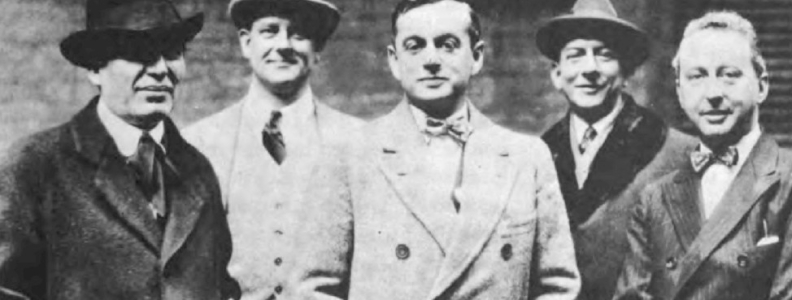Monday Morning Post–1917 Jerome Kern’s Annus Mirabilis
Our featured image captures an early photo of Jerome Kern (far right), with his producers and collaborators: far left is Morris Gest (producer), then P.G. Wodehouse (lyricist and librettist), Guy Bolton (lyricist and librettist) in the center, followed by Ray Comstock (producer) and Kern. Jerome Kern came into public prominence in 1917; the first show of the year was his, a modern, American musical comedy called Have a Heart. It opened on January 11, 1917 and was quickly followed by Love O’ Mike, the second show of the year, which opened on January 15, 1917.
Have a Heart was produced by Henry W. Savage, and featured a book and lyrics by Guy Bolton and P.G. Wodehouse. Love O’ Mike was produced by Elizabeth Marbury and Lee Shubert and featured a book by Sydney Smith and Augustus Thomas, Jr., with lyrics by Harry B.Smith. You can read more about the remarkable career of Elizabeth Marbury on our website, under Production Personnel.
Kern’s third entry in 1917 was the musical, Oh, Boy!, which opened on Broadway February 20, 1917. It was the second collaboration that year with Bolton and Wodehouse and was produced by Ray Comstock and William Elliott.
Kern’s fourth show in 1917 was the musical, Leave It to Jane, which opened on Broadway August 28, 1917; it marked the third collaboration that year with Bolton and Wodehouse and was produced by Comstock, Elliott and Morris Gest.
On November 5, 1917, a musical revue called Miss 1917 opened on Broadway, featuring music by Victor Herbert and Jerome Kern, with sketches by Bolton and Wodehouse. One of the songs was the remarkable Kern tune, “The Land Where the Good Songs Go.”
Just missing being included in Kern’s annus mirabilis (literally defined as miracle year) was the musical, Oh, Lady! Lady!, which did not get to Broadway until February 1, 1918. It too featured a book and lyrics by Bolton and Wodehouse and was produced by Comstock and Elliott.
All of the Kern musicals featured orchestrations by Frank Saddler and were intended to be performed in smaller theatres; not all were opened in The Princess Theatre, but all of the musicals written in this period were included in what has been termed Kern’s “Princess Theatre period.”
Historically, it is important to realize that Victor Herbert and George M. Cohan became Broadway legends in the early 1900’s; 1917 would mark the last of Victor Herbert’s great operettas, with the production of Eileen, and would mark the onset of Kern’s great musicals.
We are going to start our look at Kern’s remarkable year of 1917 with the John McGlinn Overture from Have a Heart, recorded on EMI/Angel.
We will post the Spotify version of the Overture shortly.

